This is stupid.
Is there anything else to say? What do you say to a disastrous creative decision that exists purely to ruin the legacy and central relationship that drove a show for six years?
The writing was on the wall and the fans read it. Bellamy missing from the season poster, Bob Morley missing from the countdown set images from Jason Rothenberg’s twitter, Morley’s twitter post shot in Los Angeles when the finale was being filmed, Morley’s other cryptic tweets, and a sinking, sinking feeling that the fan-favorite would not make it to the finale, let alone the end.
Yet, what happens in The 100’s “Blood Giant” was somehow so much worse than anyone could have imagined, even with the above considered.
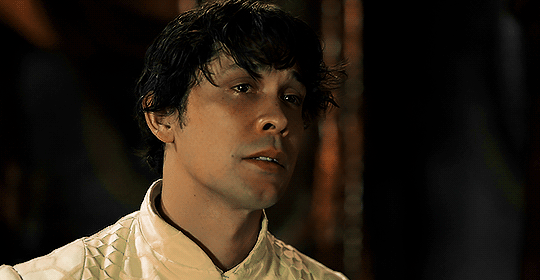
This is unbelievably stupid.
The 100 is a cautionary tale for creatives who choose to not learn from their mistakes. It makes a career out of killing fan-favorite characters, important characters that provide audience sought-after representation, but not in ways that narratively enrich the story.
The 100 has killed Black man after Black man. It has gruesomely done so with harmful imagery. The 100 has killed a lesbian after she consumates with her lover and then opted to keep every other LGBT character, save for the lead, as queer set decoration.
And now The 100 has carelessly murdered its leading man, one who was important as Asian representation. Not only was Bellamy sacrificed for no damn reason, but The 100 decided to assassinate its only noteworthy LGBT character in the process, one who has been heralded as the first bisexual leading lady on network television.
Advertisement
This is enough convincing evidence that proves that The 100 doesn’t care about its viewers. It’s also evidence enough to prove that The 100 doesn’t care about its story.
Bellamy’s death sequence goes against all the significant emotional moments from season six of The 100.
What sense does it make to put the characters at odds in one season, spend the entire next season displaying what lengths Bellamy would go to save Clarke only for her to murder him? How does it make sense to have Clarke admit her mistakes from before, have her declare she would never forget he was her family, only to have her murder him? How does any of this follow the same track that drove the sixth season?
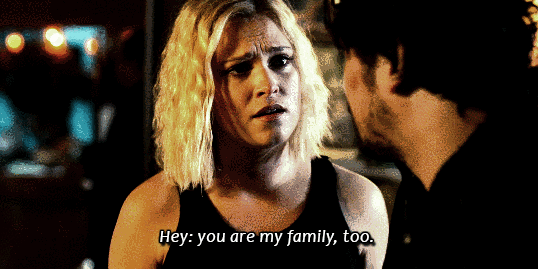
This is confusingly stupid.
Advertisement
Season seven was insult enough to Bellamy Blake without the messiness of his death. Factoring in his treatment in The 100’s farewell season makes his death so much more cruel.
Being primarily absent for the majority of the season may have been out of the writers’ control. Jason Rothenberg did detail to TV Guide that Morley requested time off from the season. However, Rothenberg did not reveal how much time, nor has Morley publicly spoken on the subject himself.
That doesn’t excuse the narrative mishaps that revolved around Bellamy. Even when he was missing there wasn’t much care given to him. Leading into the season, an important question to ask is this: why did Bellamy skedaddle into the woods so quickly, leaving Clarke in Sanctum destroyed by the death of her mother and left to clean up the mess of their latest war?
This last out-of-character action of season six catapults Bellamy’s character into the events of season seven. This allows for the undermining of his character by others in his absence, as well as allowing for the story to shift to new leading characters, such as Hope, Echo, and Sheidheda, all while ignoring the ones who are developed and close to Bellamy (the actual leads of the show, Clarke and Octavia).
Advertisement
Octavia’s story, other than the identical set-up features in The Garden used to add meaning to Octavia’s late-season-six plot, revolves around Diyoza and Hope as a new family unit. When Bellamy dies in front of her, that is the only moment of grief shown. Octavia’s remaining time between his death and his return is spent furthering Echo’s dysfunctional coping rather than her own. When she is reunited with Bellamy, she barely gets a few sentences in before being sent to Earth for safe-keeping.
Even for people who are not fans of the Blakes and their relationship can see the absurdity of the two siblings, the only siblings, of The 100 not even approaching a semblance of closure.
Octavia Blake is hundreds of thousands of miles away from her brother when he dies. He was the man who raised her. He was the man who left her. But he was also the person who forgave her, love her, and even if it didn’t always look like it, he was the person who tried to save her.
They never got a chance to find each other again outside of war. And The 100 never allowed Octavia to take her time and feel her own pain in the aftermath of his apparent death. This speaks to Bellamy’s importance as decided by the writers. Giving Octavia no time to mourn her brother, while giving Echo all the Bellamy-related screentime is declarative. Bellamy isn’t that important.
The 100 season seven skimps on the people closest to Bellamy (based on onscreen development) and focuses on the genocidal tendencies of a character The 100 actually cares about. Bellamy is just an excuse to give Echo violent content.

Speaking of Echo (who has been a frequent topic of conversation here at TYF), there’s no way to assess the poor treatment of Bellamy in his absence and how it worsens the impact of his death without discussing her.
While Bellamy’s demoted significance is obvious in the way that Octavia’s arc and her reaction to her brother’s death is absent, the insult to Bellamy is perhaps the loudest with Echo’s bastardization of who Bellamy actually was.
You don’t have to look far to find evidence of this. Very early on in the season, Echo abandoned and emotionally tortured her ally, Orlando, while Bellamy worked with Doucette in order to survive. And when Bellamy had opportunities to leave him, he saved him.
Echo senselessly murdered to find Bellamy. When she saw evidence of his death, she murdered to avenge him. While this may have meant to be perceived as some huge romantic gesture, it doesn’t play out that way. When finally reunited with Bellamy, Echo appeared to fight the least to save his soul, and Bellamy wasn’t nearly as emotional upon learning the trauma she endured to fight for him as he was upon facing Clarke, someone The 100 previously had showed through Bellamy’s actions that he loved deeper.
Another clear example of this, and perhaps the worst one considering Clarke’s reasoning for killing Bellamy (that still feels so messed up to type), is Jackson’s “therapy session” with Madi. Discussing Madi’s trauma regarding The Flame, Jackson paints Bellamy in a negative light, and while criticizing his decisions in season five is more than valid, it’s unfair to disregard his intentions. With Bellamy absent, he was not allowed to speak on the subject, so the audience, once again, is only subjected to what one could argue is Bellamy’s mistakes. Bellamy is gone, talked about less than adequately, or is lumped in with Clarke’s “friends.”
Most of these issues culminate in the climatic scene of “A Little Sacrifice.”
This scene is a perfect example of the work that season seven does to sour Bellamy Blake’s memory for the purpose of making his “betrayal” more digestible to the audience.
Firstly, much of the material that is cut is of Miller’s lines, and these are important. Miller knows what Bellamy would have wanted, and he portrays Bellamy in a positive light. But much like most of Miller’s scenes, they are cut from the scene, and Miller remains as someone in the background even though he has potential for more. Who cares that he’s been Bellamy’s friend and go-to guy since the beginning, right?
And then there’s Raven. She has always been a character of high standards. So much to the point as many fans growing to dislike her in later seasons as her moral highground began to overshadow her compassion. But even compassion is laced with negatives as she brings up Bellamy’s army massacre which, to clarify, he did with several others after being attacked the day they landed on the ground. It was after Lexa walked-back on their deal, resulting in Clarke and Bellamy committing mass murder in the mountain to save their people and after another attack was orchestrated on their people in the mountain months later. All with an army of three hundred people sitting outside his home for “peacekeeping.”
Raven’s words continue to villainize the character, bringing up his biggest mistake and dressing it up as revenge in order to liken Echo to Bellamy.
Bellamy and Echo are not the same.
In the very same scene, Echo tells Clarke that she doesn’t know what Bellamy would have wanted. Echo tells Clarke that in the same situation that Bellamy would be where she was. The ingenuity sticks out like a sore thumb.
Not only has The 100 made it blatantly clear that Bellamy and Clarke know and trust each other more than anyone else, but Bellamy was in the same position as Echo was, lest she forgot. When he was in that situation, he used Clarke’s memory to stand down and find a way to survive.
The blatant misrepresentation of an absent character is something The 100 does well. (Re: Lexa) The 100 also tends to use this tendency to elevate character, but in Bellamy’s case, The 100 uses it to slowly plant the seeds of his betrayal and faith that he would find. Content (albeit, not all) is removed, changing the ratio of good actions and bad, allowing the negative anecdote to carry more weight, and to represent Bellamy as a person less good and selfless than he actually was.

This is heartbreakingly stupid.
So, Bellamy’s death goes against Bellamy and Clarke’s arc in season six. Bellamy’s death is worsened and his character mishandled by the narrative choices made in season seven. How does Bellamy’s death fit into the entire narrative of the show?
Bellamy and Clarke were the core relationship of The 100. Combined with the Blakes, they made the heart of the show, and much of the show was built upon what they meant to each other.
Bellamy and Clarke were the leaders of the 100. They started out as rivals, but eventually developed trust and friendship until their relationship seemed to transcend to the deepest relationship shown on The 100. This just isn’t opinion, even Jason Rothenberg confirmed this.
However, following Bellamy’s death, Rothenberg also released a statement that raised several red flags.
If Bellamy and Clarke exist as the central relationship of the show, and The 100 is all about who you’re willing to protect, then doesn’t it make sense that Clarke and Bellamy would protect each other above almost all else?
Yes, Clarke and Bellamy both have attachments to their sister-daughters. But it’s hard to take any emotional stake in Madi and Clarke’s relationship, at least when comparing it to other familial or even non-familial relationships. Madi wasn’t a true character until season five and their bond formed off-screen.
This is the same reason that Spacekru’s dynamic (including Bellamy and Echo) has not taken off in the way The 100 wish it had. Especially considering the way the members of the space family take turns in betraying each other.
Really, the root of a significant portion of The 100’s current issues stem from the time-jump. It’s the worst creative decision The 100 willingly made.
The matter of the fact is that Clarke deciding that just the mere possibility of Madi being harmed justifies shooting her best friend in the heart doesn’t carry the emotional weight that any other sacrifice would make.
Bellamy endangering Octavia for Clarke in season five is clearly a similar set-up, and it packs a punch. Instead, days later after “Blood Giant,” it’s hard to believe or trust what transpired on the television screen.
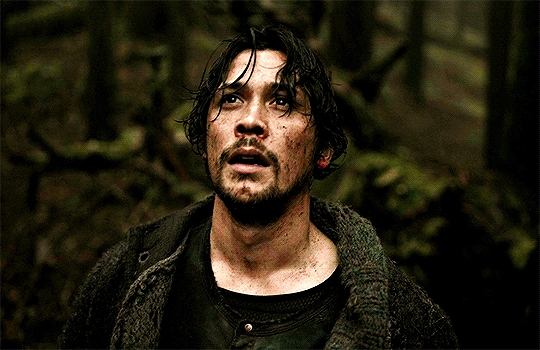
Bellamy and Clarke have the weight of the entire series on their shoulders. They have chosen each other time and time again. Bellamy left everyone in Sanctum behind to rescue Clarke. Bellamy played all of his cards against Eligius to rescue her. Bellamy trusted her time and time again. Clarke was willing to sacrifice the human race for Bellamy during the conclave. Clarke sacrificed half of the spots in downed Ark when Roan held him captive. Clarke called Bellamy for 2,199 days.
And The 100 expects its audience to believe that Clarke wouldn’t try to understand Bellamy. That she would so easily write him off despite all the faith he had in her. That the only option she had was to shoot her best friend in the heart.
The 100 isn’t just about who we are willing to sacrifice. It’s about how love and hope can change others. It’s about looking at people who are different than ourselves and learning from them. It’s about the impossible choices we have to make.
Except, this wasn’t an impossible choice Clarke had to make.
Bellamy’s death doesn’t go to the heart of The 100. Bellamy’s death shoots The 100 in its heart.
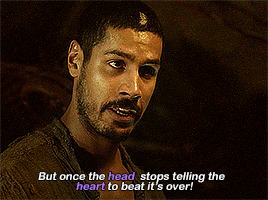
This is senselessly stupid.
So much so that it leaves no room to talk about anything else — not Raven’s extravagant grief over killing four people (this is a show where some characters have killed thousands), not Gabriel’s shining arc and deep dive into his character, not the stupidity of not killing Sheidheda again.
And maybe the death of a leading character (meaning a lead character in terms of narrative, not billing) could have worked in the right circumstances. However, this would require consistency, which The 100 doesn’t know anything about. The desecration of a relationship as built up and beloved as Bellamy and Clarke’s would have required planning from day one, which clearly didn’t happen.
Bellamy’s final arc on a show he led for six seasons was created for him to die. There is no other way for Bellamy to die at the hands of Clarke any other way. And sloppily done, no less.
Clarke shoots Bellamy over Madi’s sketchbook. Madi was safe on Earth with only Cadogan knowing the code to open the anomaly. Even if she left the book, there was no way for Bellamy to reach Cadogan, Clarke’s prisoner.
She shot him in the heart. Not a shoulder, nor a hand, nor a leg. If she wanted to keep the book a secret, why didn’t she shoot the book? She had already planned to leave Bellamy at this point. She could have killed Cadogan and be done with it.
Clarke shot Bellamy essentially and nothing changed because of it.
But these moments weren’t about what the plot needed. The plot was created for this. It is almost as if Bellamy’s story was created backwards.
“We need to kill Bellamy Blake at the hands of Clarke Griffin. Let’s brainwash him, but only to the point to where Clarke has to kill him. And then let’s sprinkle in some Bellamy hate throughout the season to further make it clear that Clarke is doing the right thing!”
The 100 wanted to write off this character and compressed all of this story into only three episodes. If you’re going to try to convince the audience that Clarke would kill Bellamy, respect the viewers and the dedication to The 100 enough to where you don’t undo eighty-four episodes worth of development and growth in three episodes.
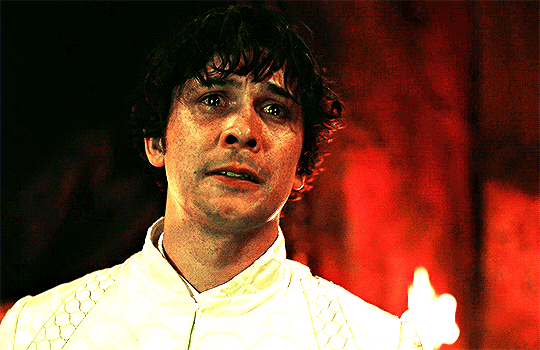
But here’s the kicker: this moment is not only made to write-off Bellamy, but it also kills the relationship between the two, and Clarke, herself.
This scene is careful about calling back to several key Bellarke moments that are symbolic of their bond.
“So much for together,” Clarke tells Bellamy, calling back to a key word that described their entire relationship. No matter what strife and hurt they went through, they always found their way back to each other, and tackled whatever ailed them together. They pulled the lever in the mountain together. They worked together to destroy the City of Light, Bellamy on the outside, Clarke on the inside. It was together that they tackled Sanctum, with Bellamy on the ground and Clarke in the sky.
“You’re not going to shoot me, Clarke,” Bellamy tells Clarke, calling back to the time he was on the same side of the barrell. This calls back to the events before Praimfaya, when Clarke couldn’t make it a killshot because she couldn’t lose someone else she loved. Bellamy is still the man she loves. And it was after this that they made up in the rover, commiting vehicular manslaughter in the process. But this moment magnifies the capacity they both have for forgiveness.
This is not the first time they have been on opposites sides. But each time, they forgave each other. It’s this deep knowledge of the other that allows them to be truly vulnerable, which makes the two of them stronger together. The 100 has always pushed the idea that things go wrong when they’re not on the same side, well, maybe until now.
And finally, right before Clarke pulls the trigger, Bellamy apologizes for what he has to do to save them all (including Madi). Clarke tells him, “Me too.” This calls back to their epic altercation in “Hakeldama,” where Bellamy truly shows his vulnerability, Clarke’s absence weighing on his heart and bringing him to tears. Although this moment was a brought spot for them, the openness of both of them is noteworthy, and further laid down their foundation for being open with the other, and draws attention to Clarke and Bellamy’s personal importance in each other’s lives.
Each of these moments crafts a death scene ultimately cruel to the fanbase of Bellamy and Clarke. No matter whether they’re viewed as platonic or romantic, this scene takes what makes these two so beautiful and throws it back in their faces like the fans were foolish to ever love these two. Together? Forgiveness? Here’s a shot in the heart.
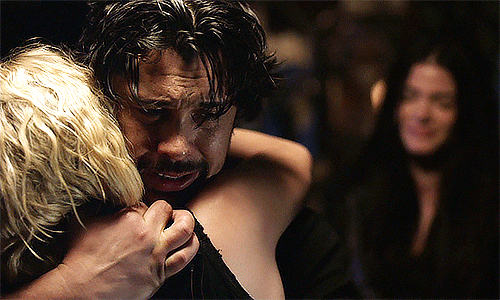
“Blood Giant” punishes fans for ever caring about Bellamy and Clarke as a unit, destroying what should be the focal point of The 100, and that’s not Bellamy and Clarke. It’s the fans who love this show, who have made fanart and fanfiction, who tweet and watch the show every night it airs, who spend hundreds of dollars on merch and conventions, who have made The 100 what it is.
The 100 doesn’t learn. It’s killed fanbase after fanbase. It punished Clexa fans, knowing that Alycia Debnam-Carey booked another show and would have to be written off, it punished Kabby fans by killing both characters twice, it punished Marper fans by using their legacy as a soundbite to never be taken seriously, and it punishes Bellarke fans for never losing faith in The 100 and for never giving up hope, even in trying times, in two characters who truly have a special and unique bond.
The 100 doesn’t deserve Bellamy and Clarke. The 100 doesn’t deserve Octavia. The 100 doesn’t deserve Raven, Murphy, Gabriel, or Emori.
The 100 doesn’t deserve you.
What was the point? What was the point in investing in characters and a dynamic that was ever evolving, ever changing, and inspiring hope in each other? That hope is gone now. Bellamy is no longer breathing.
The 100 doesn’t just kill off Bellamy Blake, but it taints every significant moment between Clarke and Bellamy had that came before. It rips it all of its meaning. Bellarke now exists devoid of anything.
What once rang true now rings false. Everything that Bellamy and Clarke had with each other is undermined by the events of their final encounter. Not only does this break The 100 moving forward, but it rips every moment before from the audience. How is a rewatch ever possible, knowing their cheap, underserved, and unearned fate?
As I write this right now, thinking about all that they meant to me, and meant to the people I have come to know and love, I am in tears.
Why does The 100 continuously do things that feel spiteful to the fans?
The 100 doesn’t reward any of its viewers for their investment, instead, it opts for the story that inflicts the most pain without having anything bright at the end of the dark, edgy, don’t-watch-the-show-for-ships tunnel.
Not only does The 100 sloppily remove its leading man, but it kills its leading lady as well.

This is incredibly stupid.
Clarke Griffin also is dead, at least it feels like she is.
Clarke has felt like a shell of her former self the entire season. Not only have her appearances diminished, but when she is on screen, she no longer has felt like the lead. She comforts Raven, points a gun, says something about her “friends,” comforts Raven again, rinse and repeat.
But even through these motions, she’s not driving the plot. Her emotions and desires don’t seem to drive anything forward. The plot (and other characters) use her again.
And while Clarke felt empty and hollow for the majority of the season, The 100 only amped this up with Bellamy’s return.
That’s not to say Clarke isn’t well-acted. Eliza Taylor does a phenomenal job as always, even in scenes that feel so foreign to what we know as Clarke. As enraging as her decisions are in these moments, Taylor plays the emotion heartbreakingly well, even if this isn’t Clarke.
One of the biggest misdeeds with this plot happens to be the vagueness about it. Bellamy’s epiphany is perhaps the vaguest things on the show, showing how little care for Bellamy was considered in executing the episodes he appears in.
Bellamy sees a light, makes a few prayers, and badaboom — he believes in transcendence and The Shepard. Even as Bellamy explains this to Clarke, it sounds wonky. But still, it makes little to no sense that Clarke doesn’t even try to understand him.
What happened to Clarke’s trust in him? What happened to her compassion that people don’t give her enough credit for? She once told Bellamy he was special, but all it takes is him revealing her deception for her to completely write him off.
It’s not like her lie would have worked anyway. What was to stop Cadogan from seeking out her friends once they returned to Sanctum? If anything, Bellamy clearing the air actually gave them a shot at survival.
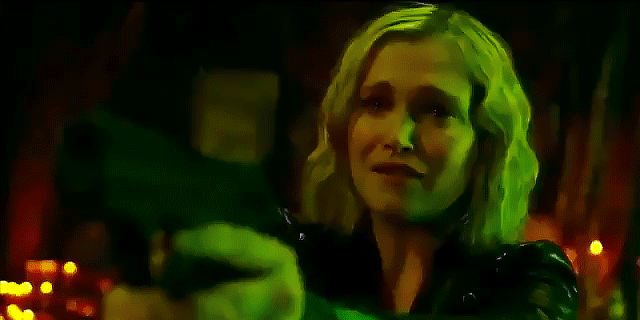
Bellamy believed her when Clarke went into the City of Light, and it seems ridiculous that she wouldn’t extend him the same courtesy after entrusting him with her life time and time again.
This lack of trust could perhaps be written off by Clarke’s emotional state or emotional rollercoaster that she experienced in result to the news of his death. There’s no excuse, however, for the writing of Clarke in “Blood Giant.”
As already discussed, Clarke had so many other options in that moment. It’s hard to imagine how she’ll break the news to the others who love Bellamy: Octavia, Miller, Raven, Echo. But the work of season seven helps lighten that load, considering the degree that the season villainized him.
Still, it’s impossible to view Clarke Griffin the same way. The suddenness of killing Bellamy doesn’t follow the track of Clarke’s character. She cried for him days ago. She wasn’t on a downward descent as Octavia was. Clarke has sacrificed much for Bellamy in the past.
Perhaps she was willing to do anything for Madi before, but hadn’t season six clearly show her growth? Madi is her family, but Bellamy is, too. Clarke said she wouldn’t forget that. Doesn’t this conversation imply that she had moved past the binary of Bellamy or Madi? Of Madi above all else? What happened to this character development?
How can one foster the same amount of love for a character who murdered their person, for the sake of a character introduced so late in the game with little screentime for a bond to resonate with fans? Bellamy is so loved that the natural reaction for fans would be to swear her off.
Everything about placing this on Clarke’s shoulder is brash and cruel. Clarke’s emotional burden is enough to boot without adding the murder of her best friend for really no reason on top of it.
Who is Clarke Griffin now? Not someone that fans will want to root for. The 100 mercilessly tortures its women, and frankly, this is too far. Any type of explanation will not feel genuine and not be organic to the story, and this story hasn’t been organic all season in the first place.
It’s enough to rip away Bellamy and Bellarke from fans, but this rips Clarke away as it alienates her from the fans who followed her story for seven years.
There’s barely anything left.
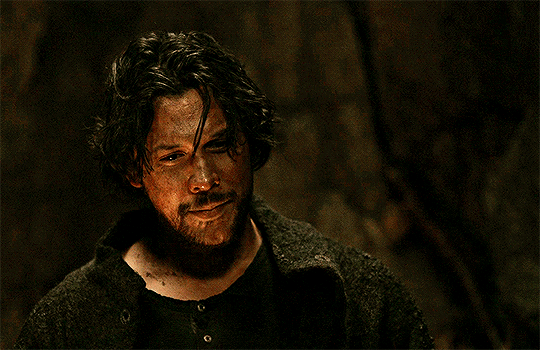
This is otherwordly stupid.
Bellamy Blake’s death was not that of the man so central to The 100. It wasn’t a death worthy to the fans. It wasn’t a conclusion worthy of the character.
Bellamy’s final farewell did not serve the character, nor any of his relationships. While the relationship with Echo is one of the poorest written in the show, that’s left open. More importantly, Bellamy’s relationship with Miller is also left unresolved which is even more disappointing considering the two have had at least one cut scene this season.
Bellamy will never have closure with his sister. He’ll never get the true chance to see her changed and be able to interact with her while she remembers why she changed.
The last thing Bellamy saw after his best friend shot him in the chest was her running away.
Bellamy’s death lasted mere seconds. Bellamy’s death was gruesome (a habit The 100 tends to have when killing its men of color). Bellamy’s death was given less time than Nelson’s for crying out loud.
Bellamy Blake is a character driven by his heart and love for the people around him, and in the end, humanity itself. He was selfless and always put the needs of others above his own, not allowing himself anything selfish until he left everything behind for the possibility to save Clarke. And this is the thanks he gets.
Bellamy Blake died alone, not just physically, but emotionally. While he may have subscribed to the idea of transcendence, he never took on the mentality of the Disciples. Even under the guidance of Cadogan, every action he took, he took to not just save humanity, but he took it to save the individuals he loved. He bargained with Cadogan continuously to try to find a no-lose scenario. Instead, he was the only one who lost.
When Bellamy died, he felt that every single person who loved him hated him, including his best friend, his girlfriend, his sister, his second, and the family he had found in space. Emori was the only one who didn’t jump to judge him. He even had to witness Doucette die moments before his own death.
Bellamy wasn’t only emotionally isolated, but physically as well. Clarke ran as the anomaly closed, leaving his last moments (if they weren’t watching her leave) with a few Discples and Sheidheda. The last thing Bellamy needed was to be with a Commander in his final moments.
Is there supposed to be some sort of irony in the person with the biggest and most gracious heart dying completely and utterly betrayed and alone?
Bellamy’s death was muted and isolating, and he deserves more as a person who only tried to protect and love others, even if sometimes that led him astray. He always came back. Nobody will come back for him.
Bellamy’s death means nothing. He didn’t die protecting someone, he didn’t die saving someone’s soul like Diyoza did, he didn’t die for a cause, and he didn’t die knowing he was loved and charished.
He just died.
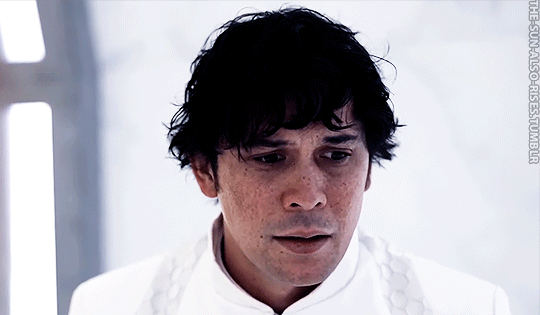
This is mindnumbingly stupid.
So, what’s the damn point?
The 100 has presented itself as a world ravaged by tribalism, war, loss, and trauma. However, this has never been the true theme.
Yes, The 100 may appear nihilistic in ways. But hasn’t The 100 always been centered in love and hope?
Clarke and Bellamy against all odds form a bond and save a community of children thrown into a world they weren’t made for.
Wells sacrificed his best friend to protect her, even if it means loss.
Lexa works against the society she was born in to try to forge a new, better way. She falls in love again, and even in her death, she’s made her mark on Clarke, and consequentially, the world that’s still left.
The City of Light is destroyed because even if there is pain, pain is something that can be overcome, and there is hope that they can do it.
Raven brought herself back to life, spurred on by the memory of her father-figure.
Octavia, a girl born under the floor, learns to understand and forgive her brother, and forge a family of her own.
Clarke sacrifices herself, accepting death, for the people she loves.
Murphy, a boy hurt by the chokehold of rules, and Emori, a girl thrown out for the way she was born, find each other, take on the world, and create their own type of family.
Monty and Harper dedicate their lives to find a place to start over, and in the process have a son who represents all the best qualities in them.
Bellamy finally chooses something for himself, and saves Clarke against all odds.
Diyoza sacrifices herself in hopes to save her daughter’s soul.
The 100 includes death, torture, sacrifice, and pain, but every major story beat includes hope, love, and family. At least we thought.
If The 100 were about these things, why would it so needlessly kill off its leading man? The man who inspired much of these characters and acted as a string to tie them all together was so callously sacrificed for no discernible reason and in a last-minute decision. How could the bonds be so easily sacrificed when almost every family unit on The 100 is a found-family unit?
Maybe humanity is just all bad. If Clarke is willing to sacrifice Bellamy so easily, then maybe these bonds don’t matter. Maybe love doesn’t matter if it taints the most powerful of connections and turns people who crossed death and space for each other.
Maybe humanity fails the test. Maybe we’ve already lost the war. And nothing is too precious to sacrifice. Perhaps, we’re already too tainted.
What’s the point? Perhaps humanity is the real Wanheda made along the way.
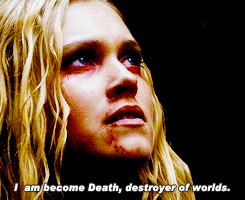
This is stupid.
Bellamy Blake was never given what he deserved, and neither were his fans.
Bellamy Blake never had a happy life. From a young age, he essentially had to step up into a role as a father. He blamed himself for his sister’s imprisonment and his mother’s death. Bellamy believed he killed someone to protect his sister, and from then on it was his duty to protect everyone.
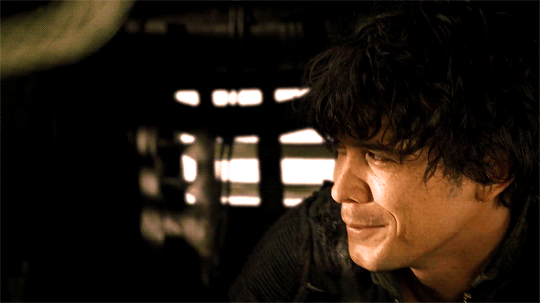
He had family killed, he had people he looked after murdered. He lost his girlfriend, and he thought he lost the woman who understood him best, and when he found faith, she shut him out and he lost her and his life.
Bellamy’s arcs rarely focused on himself. Bellamy most of the time existed to further someone else’s story — Octavia’s, Clarke’s, and perhaps more than anyone else, Echo’s.
Bellamy, still, meant so much to fans. He was important as a leading Philipino man, and one who was so driven by emotion and showed so much love to so many people.

But Bellamy became this force due to Bob Morley, the actor behind him who put so much heart and care into the character, he became him onscreen. Bellamy Blake drew people in, and once he did, it was almost impossible to look back, even as he lost and found himself.
Bellamy’s treatment in the final season of The 100 isn’t worthy of the character, the actor, or the people who fell in love with one or both. Bellamy Blake deserved more than to be discarded on the screen and behind it.
And this will be The 100’s legacy. The callous discarding of characters that provided unique and important representation. The 100 won’t be able to escape it. It’s unfortunate, considering how much potential is wasted in front of the audience’s own eyes, but if there’s one thing to come of stories like this, hopefully, it’s a new generation of writers and creators who will know what not to do from these failures and create dynamic, heartfelt, and smart television in the decades to come.
Rest in Peace, Bellamy Blake. You are finally free.

Advertisement







